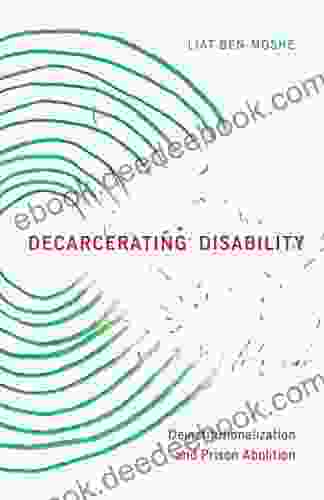Decarcerating Disability: Deinstitutionalization and Prison Abolition

4.5 out of 5
| Language | : | English |
| File size | : | 1337 KB |
| Text-to-Speech | : | Enabled |
| Screen Reader | : | Supported |
| Enhanced typesetting | : | Enabled |
| Word Wise | : | Enabled |
| Print length | : | 365 pages |
The United States has the highest incarceration rate in the world, with over 2 million people behind bars. A disproportionate number of these individuals are people with disabilities. In fact, people with mental illness are 10 times more likely to be incarcerated than those without mental illness. This is a direct result of the systemic oppression of people with disabilities, which includes a long history of deinstitutionalization and the criminalization of poverty and mental illness.
Deinstitutionalization
Deinstitutionalization is the process of moving people with disabilities out of institutions and into community-based settings. This process began in the 1950s with the advent of new psychiatric medications. However, deinstitutionalization was not accompanied by adequate funding for community-based services. As a result, many people with disabilities were left homeless, unemployed, and without access to the support they needed.
The lack of community-based services led to an increase in the criminalization of people with disabilities. People with mental illness were often arrested for minor offenses, such as loitering or disturbing the peace. They were then funneled into the criminal justice system, where they were often subjected to abuse and neglect.
Prison Abolition
Prison abolition is the movement to end the use of prisons and jails. Prison abolitionists argue that prisons are violent, racist, and ineffective institutions that do not make our communities safer. They believe that we should invest in community-based solutions to the problems that lead to crime, such as poverty, lack of education, and mental illness.
Decarcerating Disability
The movement to decarcerate disability is a call to end the systemic oppression of people with disabilities. This includes ending the criminalization of poverty and mental illness, and providing adequate funding for community-based services. Decarcerating disability will require a fundamental shift in the way we think about disability, and a commitment to creating a more just and equitable society.
How to Get Involved
There are many ways to get involved in the movement to decarcerate disability. Here are a few ideas:
* Support organizations that are working to end the criminalization of poverty and mental illness.* Educate yourself and others about the intersectionality of disability, deinstitutionalization, and prison abolition.* Advocate for policies that will provide adequate funding for community-based services for people with disabilities.* Challenge the stigma associated with disability and mental illness.
The movement to decarcerate disability is a vital part of the fight for a more just and equitable society. By ending the systemic oppression of people with disabilities, we can create a world where everyone has the opportunity to reach their full potential.
4.5 out of 5
| Language | : | English |
| File size | : | 1337 KB |
| Text-to-Speech | : | Enabled |
| Screen Reader | : | Supported |
| Enhanced typesetting | : | Enabled |
| Word Wise | : | Enabled |
| Print length | : | 365 pages |
Do you want to contribute by writing guest posts on this blog?
Please contact us and send us a resume of previous articles that you have written.
 Book
Book Chapter
Chapter Story
Story Genre
Genre Reader
Reader Library
Library Paperback
Paperback Magazine
Magazine Newspaper
Newspaper Paragraph
Paragraph Shelf
Shelf Bibliography
Bibliography Foreword
Foreword Preface
Preface Synopsis
Synopsis Footnote
Footnote Manuscript
Manuscript Scroll
Scroll Codex
Codex Classics
Classics Library card
Library card Narrative
Narrative Biography
Biography Thesaurus
Thesaurus Character
Character Librarian
Librarian Catalog
Catalog Card Catalog
Card Catalog Periodicals
Periodicals Study
Study Lending
Lending Reserve
Reserve Journals
Journals Rare Books
Rare Books Special Collections
Special Collections Thesis
Thesis Dissertation
Dissertation Storytelling
Storytelling Book Club
Book Club Theory
Theory Brad Meltzer
Brad Meltzer Ayca Arkilic
Ayca Arkilic Vanessa Evetts
Vanessa Evetts Fabio Meneghini
Fabio Meneghini Tere Kampe
Tere Kampe Vincent Tuckwood
Vincent Tuckwood Elena Woodacre
Elena Woodacre Daniel Voigt Godoy
Daniel Voigt Godoy James E Doyle
James E Doyle Ruth Phillips
Ruth Phillips Colleen Kelley
Colleen Kelley Helen Prejean
Helen Prejean John Nichols
John Nichols Michel Luc Bellemare
Michel Luc Bellemare Victoria J Coe
Victoria J Coe Chase C Mooney
Chase C Mooney Guido Meda
Guido Meda David Breskin
David Breskin Nadia Schadlow
Nadia Schadlow Philip Gray
Philip Gray
Light bulbAdvertise smarter! Our strategic ad space ensures maximum exposure. Reserve your spot today!

 Grayson BellDouble Bass Single Pedal Bounce Technique: A Comprehensive Guide to Improving...
Grayson BellDouble Bass Single Pedal Bounce Technique: A Comprehensive Guide to Improving...
 Jaylen MitchellModern Irish Crochet Lace Blouse: A Timeless Masterpiece of Delicate Beauty
Jaylen MitchellModern Irish Crochet Lace Blouse: A Timeless Masterpiece of Delicate Beauty Gordon CoxFollow ·18.5k
Gordon CoxFollow ·18.5k Edmund HayesFollow ·16k
Edmund HayesFollow ·16k Colin FosterFollow ·6.6k
Colin FosterFollow ·6.6k Eric HayesFollow ·11.2k
Eric HayesFollow ·11.2k Cormac McCarthyFollow ·12.8k
Cormac McCarthyFollow ·12.8k Charles DickensFollow ·9.3k
Charles DickensFollow ·9.3k Caleb LongFollow ·12.5k
Caleb LongFollow ·12.5k Anton FosterFollow ·8.1k
Anton FosterFollow ·8.1k

 E.E. Cummings
E.E. CummingsThe Routledge International Handbook on Fear of Crime
Fear of crime is a serious problem that can...

 Fletcher Mitchell
Fletcher MitchellThe Hunchback in Hellenistic and Roman Art: A...
The hunchback, or kyphosis, is a physical...

 Victor Turner
Victor TurnerA Comprehensive Guide to Needle Felting for Moms:...
Needle felting, a captivating craft...

 Joseph Foster
Joseph FosterWhere is Scandinavia?
Scandinavia is a region in...

 Leon Foster
Leon FosterNovel Shades of Magic: A Masterpiece of Magical...
An Enthralling...
4.5 out of 5
| Language | : | English |
| File size | : | 1337 KB |
| Text-to-Speech | : | Enabled |
| Screen Reader | : | Supported |
| Enhanced typesetting | : | Enabled |
| Word Wise | : | Enabled |
| Print length | : | 365 pages |










